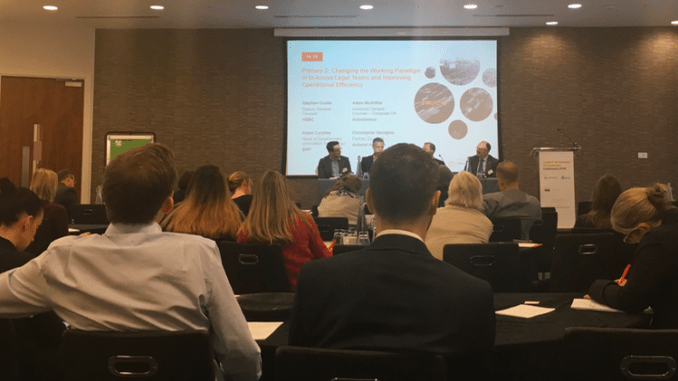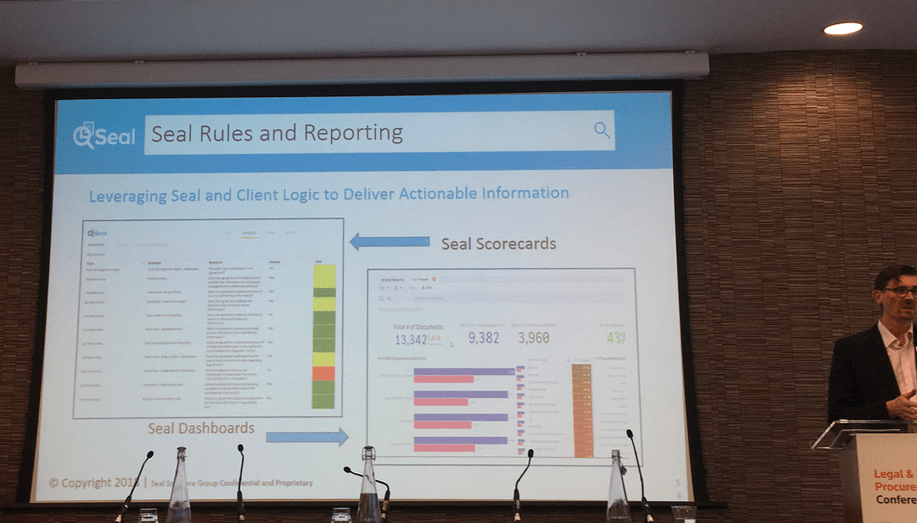
Yesterday, Thomson Reuters and Practical Law held their inaugural Legal Tech Procurement event, mainly designed for inhouse lawyers, legal ops, and procurement professionals in corporates. It was an excellent event (not just because Artificial Lawyer was a media partner…) but because the views expressed were just so refreshing and the speakers were not afraid to point at the legal department Emperor who is wearing no clothes.
A lot of events around inhouse legal teams seem to be the same old ‘soft soap’ of wishful thinking about change, but are often missing out the hard questions that help that change to really happen, such as: if legal is just another business unit of thousands of companies around the world, why is legal allowed to be 1) so lacking in management/business data about itself? and 2) treated with kid gloves by the rest of the business even though in some cases it could be spending $millions on BAU matters without proper process analysis or detailed costing?
But this time the speakers really hit things right on the nail – which we’ll come to in a moment. But, first a quick word about what else we saw.
The keynote was from Dr Joanna Batstone of IBM Watson, who gave a nice overview of the lay of the land in AI, automation and blockchain. The entire day was excellently chaired by Claire O’Brien, Legal COO, Deutsche Bank. And we saw a raft of other great speakers.
One of the tech companies which stood out, was via the presentation by Seal Software’s Mark Rollins who gave details of a capability that will analyse contracts in the negotiation phase and provide a risk analysis, based on what the company’s playbook normally is for such contracts (see Scorecard pic below).
He also explored the area of ‘intelligent contracts’ and provided another great use case for blockchain, namely that because companies have so many data silos, too much legal and business knowledge is lost, nor can parties keep track of what may have changed during negotiations in their contracts.
A single version of truth, via a blockchain, that all parties in a deal can share and see is the solution to this, he said. And it’s worth saying that Seal are very smart cookies, if they are taking blockchain seriously for this type of application then that’s a sign of the tech’s increasing maturity and acceptance in the legal world.

–
Now onto the key takeaways:
Data First
Savina Stoykova, Procurement Head at Nationwide Building Society stressed that before we all get carried away trying to improve the efficiency of a legal department we need to know where we are. I.e. how can we try to change something where we have so little real data insight into what is spent, when is it spent, how it is spent, why it is spent? What is repeated? What is standard? What is novel? What does normal look like?
How would a legal department even know it was being more efficient by using new tech tools if it didn’t even know clearly what it was doing already in economic and business process terms? It can’t, as Stoykova explained.
‘First, we need an accurate picture of our data – spending etc. before we look at any strategy. We need to understand the cost of keeping something inhouse – staff etc. We need to work with the finance team to see what the spend is. What will budgets be in the future? How will spending grow?’ she said.
I.e. this is all about money. Just saying we need to be more efficient gets us not very far. A company is a business. The legal team is a business unit. Legal tech in the legal team is there to positively impact the running of this business unit…..and that comes down to money – money spent, money saved – and how much any change in how the legal team does things will alter the budget the company will need to agree to.
It all comes down to thinking about legal and its processes with the same rigour that is applied to the logistics, sales, advertising and HR departments of a business.
Legal is Not Special
As a profession, lawyers may well be special. But the legal department of a business is fundamentally just that….a department in the business and thus needs to be treated as such. Yes – there are always going to be exceptional legal ‘events’, but a lot of what any inhouse team does is BAU activity, which cannot receive a ‘free pass’ to be done without economic scrutiny.
So, it was marvellous to hear several people on one of the afternoon panels setting out this thinking.
Stephen Cooke, Deputy GC of HSBC, explained that when it comes to inhouse lawyers ‘we have not cut the strings with private practice – we have not left the mothership. So legal is behind.’
‘Lawyers were brought into companies as it was cheaper than hourly rates. And so inhouse lawyers are a relatively new thing,’ he pointed out.
However – and this is the clincher – he added: ‘One of our ills is that we think legal is special.’
Cooke noted that a lot of efficiency can come from better process and that we need the basics to work. But, the key point is that we have here a senior inhouse lawyer at a major bank saying that legal should not be treated as if it existed in some special dimension, beyond the reach of normal business practices. I.e. it is not a special case.
That seems like a relatively simple and inoffensive thing to say, but after hearing inhouse legal experts talk about real change for 20 years….and having seen not that much change….this is actually a profound thing to get out there in the open. It’s a sort of self-realisation catalyst, one might say.
Then, Adam McArthur, at AstraZeneca, added: ‘We [as inhouse lawyers in general] are rubbish at procuring legal services. There is so much we can learn from procurement teams. We are not special. We need to have honest conversations [about procurement].’
Wow…if only all inhouse legaltech events were like this maybe things would change a lot faster.
Other Key Points
And there were also some interesting comments from Adam Curphey at BPP law school, who noted that law students shouldn’t be taught to use specific legal tech applications, but rather be armed with a set of skills that they can apply more broadly to using legal tech.
The logic is that if you train law students to use X, Y or Z doc review system, by the time they become associates the world will have moved on and they may not be able to use the tech the firm they are at is using. A fair point – although, of course, to give students some hands-on experience they will have to use some kind of tech, which will mean training on Kira, iManage//RAVN, Seal, Eigen, ThoughtRiver, LawGeex, Luminance, Ayfie etc…and these companies will very likely still be around for many years to come.
And in another insight, Chris Georgiou of Ashurst Advance, noted that we will likely see a shift in the shape of law firms.
‘The pyramid will change. The junior to mid-level group will massively shrink [in the future],’ he said.
He added that there was a lot of work that didn’t need to be done by the lawyers who were focused on advisory services and much could be done by people with perhaps some legal skills who focused on other tasks, and by people who were project managers or legal technologists. In short, the career paths and also the people doing the ‘legal work’ would be much wider – and we are already seeing that happen, with Ashurst as a good example.
–
OK, that’s all folks for this morning. There were a lot of speakers and AL will come back to some of the other themes and ideas next week. Thanks again to Thomson Reuters for putting together a great event.
Richard, thank you for your kind coverage of Mark Rollins’ presentation. The whole day was refreshingly positive and informative. The panel with HSBC, Ashurst Advance, Astra Zeneca and BPP was a particular highlight, as was the discussion between Jodi Duffield of Unilever and Alistair Maiden of Syke on the former’s roll out of a CLM and overcoming the challenges of implementing such legal tech.
David GIngell CMO Seal Software